

The personal blog of Futurist Thomas Frey » Blog Archive » 55 Jobs of the Future. “There is no future in any job.

The future lies in the person who holds the job.” – George W. Crane One of my primary complaints with higher education is that they tend to prepare students for jobs of the past. The way a Midwesterner would phrase it, “they are constantly shooting behind the duck.” Similarly, whenever a column is written about the best paying jobs of the future, jobs like civil engineers, registered nurses, and computer system analysts, they are all jobs that currently exist today. Yes, many of these jobs will still exist in the future, but every one of them will morph and change as technology and communication systems make their impact. As an example, technology research firm IDC predicts the amount of data businesses will have access to will grow 50-fold over the next decade. The first wave of baby boomers has now turned 65. As a rule of thumb, 60% of the jobs 10 years from now haven’t been invented yet. Jobs Before 2020 1. 2. 3. 4. 5. 6. 7. 8. 9. How 3-D Printing Could Change the World (Video)
Right now, the way that we come to own the majority of the objects in our homes is extremely inefficient.

We buy furniture made in Sweden, glasses manufactured in Taiwan, electronics assembled in China, and so on and so forth. Every time we need an object, we (increasingly) go to a big box store like Target or Wal-Mart or Ikea, which collect various objects manufactured and then shipped from all over the world. This is pretty rudimentary stuff, but it’s a fairly apt way of describing the way the global manufacturing economy works. Fortunately, this model, with supply chains stretching across China to South America to the US, may be on its way out, thanks to 3D printing. 3D printing is already fairly common in the industrial sector, and engineers use it to test out designs for new products. But it’s also inching nearer and nearer to commercial realization as well.
FULL PRINTED from nueve ojos on Vimeo. It seems fantastical, but in reality it’s not too far off. The personal blog of Futurist Thomas Frey » Blog Archive » Introducing: Eight Grand Challenges for Humanity. On Sunday I gave the closing keynote at the World Future Society’s “WorldFuture 2011″ event in Vancouver, BC. It was an energized crowd of inspired thinkers from around the globe, and I felt quite honored to be part of this event. As I took the stage, my goal was to introduce the crowd to a series of Eight Grand Challenges, incentivized competitions designed to push humanity to another level.
But as with many crowds, there was a formidable issue in the minds of attendees, a hurdle of acceptance before these challenges would be deemed cause-worthy. At issue was our obsession with solving all of today’s problems before we dare think about advancing humanity. How can we possibly justify advancing humanity when the money would be far better spent solving today’s massive problems? Answering this objection first, was critically important, so here is the way I presented it. If we only focus on solving today’s problems, we become trapped in the past. Three Questions History of Prizes Teams The Prize. Futurologie. Un article de Wikipédia, l'encyclopédie libre.

La futurologie a pour ambition d’aborder les différents scénarios possibles de l’avenir. Sous l'influence de l'anglais (futures research), le terme tend à remplacer celui de « prospective ». La futurologie est censée procéder à partir des données technologiques, économiques ou sociales du passé et du présent, et affirme se fonder sur des techniques et des modèles scientifiques. Le terme exclut les prédictions obtenues par des moyens surnaturels, ainsi que celles concernant le court terme (par exemple les estimations sur les fluctuations boursières).
Celles-ci sont des sciences spéculatives. La futurologie telle qu’elle se présente elle-même repose sur l’idée que chacun prend des décisions en rapport avec sa vision personnelle du futur, même de manière intuitive ou implicite. Analyse statistique[modifier | modifier le code] Raisonnement empirique sur les données historiques[modifier | modifier le code] Tâtonnements[modifier | modifier le code]